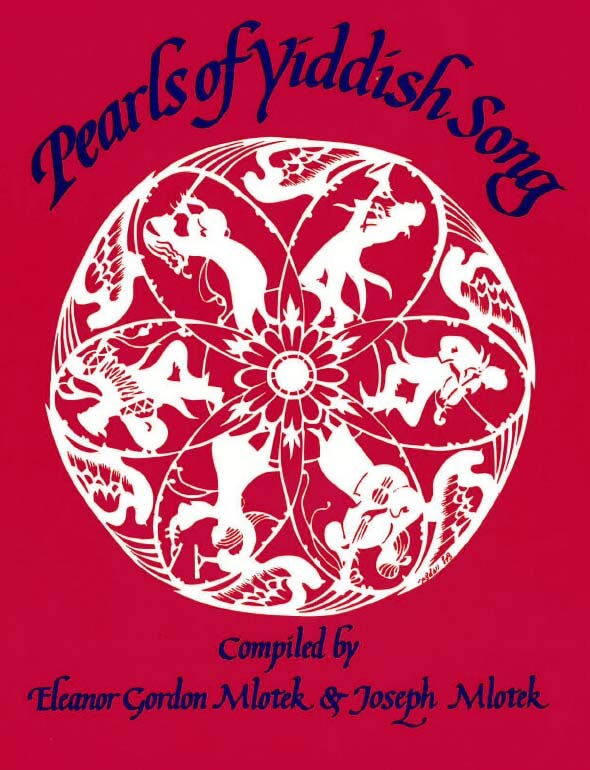Words by the well-known Yiddish poet Itsik Manger (1901-1969). There are two popular melodies — one composed by David Beigelman (1887-1944) and the other by Henekh Kon (1898-1972) — both of which are presented here. They were transcribed by the compilers from recordings of Ben Bonus and Sidor Belarsky.
In some versions of the song, the last line reads: “Un vos nokh —dos zog ikh nisht.” (And what else [she gives] — I won’t divulge).
During the Holocaust, the more popular melody by Beigelman was used for Khane Kheytin’s song “Ikh leb in geto in kavkaz” (I live in the Ghetto in the Caucasus), published by S. Kaczerginski in 1948: This melody was also used by Sam Liptzin for his song “Vi der zeyger tut a klung” (When the clock strikes).

My name is Yosl Ber and I serve in the army. I wear boots and a uniform just like — pardon the comparison — an officer.
I was a cobbler’s apprentice, I licked soles with my tongue. Today I carry a rifle, a sword, and shoemaking can go to hell.
With a broom it’s easy. I sweep the barracks and I sing. When the sweeping action is over, I thank God that night comes.
I go out on the street and look for a girl. I bow to her and give her a wink.
She invites me into her kitchen, gives me brandy, gives me wine. She gives me a roll, fish and horseradish. Oh, she’s a girl full of charm.
Heysn heys ikh Yosl-Ber
Un ikh din in militer — Oy-ra-ra, oy-ra, oy-ra,
Shtivl trog ikh, a mundir,
Lehavdl vi an ofitsir
Oy-ra-ra, oy-ra, oy-ra.
Geven bin ikh a shuster-yung,
Gelekt podeshves mitn tsung —
Haynt hob ikh a biks, a shverd,
Shusteray hob ikh in dr’erd.
Mit dem bezem iz mir gring,
Kh’ker kazarmes un ikh zing—
S’endikt zikh di bezem-shlakht,
Dank ikh got, s’falt tsu di nakht.
Gey ikh mir in gas aroys
Un ikh zukh a meydl oys —
Gib ikh zikh tsu ir a boyg
Un a pintl mitn oyg.
Farbet zi mikh in kikh arayn,
Git mir bronfn, git mir vayn —
Zi git mir a bulke, fish un khreyn,
Oy, a meydl mole-kheyn.
הײסן, הײס איך יאָסל־בער
און איך דין אין מיליטער — אױ־ראַ־ראַ, אױ־ראַ, אױ־ראַ,
שטיװל טראָג איך, אַ מונדיר,
להבֿדיל װי אַן אָפֿיציר — אױ־ראַ־ראַ, אױ־ראַ, אױ־ראַ.
געװען בין איך אַ שוסטער־יונג,
געלעקט פּאָדעשװעס מיטן צונג —
הײַנט האָב איך אַ ביקס, אַ שװערד,
שוסטערײַ האָב איך אין דר’ערד.
מיט דעם בעזעם איז מיר גרינג,
כ’קער קאַזאַרמעס און איך זינג —
ס’ענדיקט זיך די בעזעם־שלאַכט,
דאַנק איך גאָט, ס’פֿאַלט צו די נאַכט.
גײ איך מיר אין גאַס אַרױס
און איך זוך אַ מײדל אױס —
גיב איך זיך צו איר אַ בױג
און אַ פּינטל מיטן אױג.
פֿאַרבעט זי מיך אין קיך אַרײַן,
גיט מיר בראָנפֿן, גיט מיר װײַן —
זי גיט מיר אַ בולקע, פֿיש און כרײן,
אױ, אַ מײדל, מלא־חן.
Song Title: Yosl Ber

First published in 1988 as Pearls of Yiddish Song: Favorite Folk, Art and Theatre Songs, this anthology contains 115 songs. Some material had never been published, while others, included in rare song collections or sheet music, were largely inaccessible. The songs presented reflect Jewish life in Eastern Europe and the United States and depict childhood, love, family celebrations, poverty, work and struggle. There are also songs from the Hasidic and Maskilic movements, songs of Zion and of America, as well as songs from the Yiddish theater.
The title of this anthology derives from the weekly two-page feature column “Pearls of Yiddish Poetry,” which the compilers Yosl and Chana Mlotek initiated in 1970 in the Yiddish newspaper Der Forvertz (the Yiddish Daily Forward). Hundreds of readers from around the world — including authors, composers, singers, actors — became co-participants in this collective folk project and recalled melodies, lines, fragments, stanzas and their variants of songs, poems, and plays which they had heard in their youth. At first, readers sent in only written material. Later, they also taped songs on cassettes, many of whose melodies had, until then, never been recorded. They also identified and supplied missing information regarding lyricists, poets, and composers and described the circumstances surrounding the songs’ origins, their dissemination, diffusion and impact.